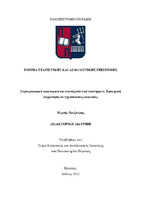Συμπεριφορικά οικονομικά και συνταξιοδοτικά συστήματα: εμπειρική διερεύνηση σε γηράσκουσες κοινωνίες
Behavioral economic and pension systems: an empirical investigation in aging societies

Doctoral Thesis
Συγγραφέας
Χουζούρης, Μιχαήλ
Chouzouris, Michail
Ημερομηνία
2022-07Επιβλέπων
Τήνιος, ΠλάτωνΠροβολή/
Λέξεις κλειδιά
Συμπεριφορικά οικονομικά ; Οικονομικά της αβεβαιότητας ; Συνταξιοδότηση ; SHARE ; Γήρανση ; Γνωστικές λειτουργίεςΠερίληψη
Η ραγδαία ανάπτυξη των συμπεριφορικών οικονομικών (behavioral economics) προσφέρει ένα εναλλακτικό εργαλείο, διαφορετικό από την κλασική θεωρία, προκειμένου να βελτιώσει την οικονομική θεωρία και τη θεωρία των ορθολογικών επιλογών. Οι ιδέες αυτές έχουν πληθώρα εφαρμογών - από τομείς της κοινωνικής πολιτικής και την ασφάλιση μέχρι το μάρκετινγκ και την υγεία. Οι δημογραφικές αλλαγές όπως η γήρανση του πληθυσμού και οι καινοτομίες όπως η παγκοσμιοποίηση και οι νέες τεχνολογίες επηρεάζουν με ποικίλους τρόπους το κράτος πρόνοιας και το ασφαλιστικό σύστημα ωθώντας αλλαγές που θα χρησιμοποιούν νέα εργαλεία όπως τα συμπεριφορικά οικονομικά. Παράλληλα η δομή του ασφαλιστικού συστήματος δημιουργεί στρεβλώσεις και ανισότητες μεταξύ των φύλων οι οποίες και επηρεάζονται άμεσα καθώς το προσδόκιμο ζωής αυξάνεται.
Σκοπός της διατριβής είναι να εξερευνήσει τους μηχανισμούς λήψης αποφάσεων υπό καθεστώς αβεβαιότητας και τη σχέση τους με τις μη ορθολογικές επιλογές. Η προσέγγιση αυτή επιτυγχάνεται με τη χρήση πειραματικών μεθόδων και αξιοποίηση διαχρονικών δεδομένων από μεγάλης κλίμακας πανευρωπαϊκή έρευνα. Στο πλαίσιο της μελέτης αυτής εξετάζεται η δομή του ασφαλιστικού συστήματος και η σχέση του με τα συμπεριφορικά οικονομικά. Παρουσιάζεται η επίδραση της πληθυσμιακής γήρανσης στα συστήματα ασφάλισης και η σημασία που αποκτούν οι αποφάσεις υπό αβεβαιότητα. Επίσης, γίνεται παρουσίαση των δομικών προβλημάτων και στρεβλώσεων του συστήματος κοινωνικής ασφάλισης και ο τρόπους που καθορίζουν τις επιλογές των ασφαλισμένων μέσα από τη μελέτη της περίπτωσης των συντάξεων χηρείας στην Ευρώπη.
Η πρώτη πηγή δεδομένων είναι ένα δείγμα προπτυχιακών φοιτητών και διερευνάται κατά πόσο η επίδοση των γνωσιακών λειτουργιών σχετίζεται με αποκλίσεις από την ορθολογική συμπεριφορά. Για την ποσοτικοποίηση των παραμέτρων αυτών, γίνεται χρήση του Τεστ Γνωσιακών Ικανοτήτων (CRT) μαζί με εργαλεία μέτρησης του αριθμητικού και χρηματοοικονομικού αναλφαβητισμού προκειμένου να κατανοηθεί η προέλευση των «μη ορθολογικών επιλογών». Η μελέτη διεξήχθη σε ένα σκοπίμως μεροληπτικό δείγμα 222 προπτυχιακών φοιτητών των οποίων το πρόγραμμα σπουδών δίνει έμφαση στη στατιστική και τη θεωρία πιθανοτήτων. Παρά τη μεροληπτική φύση του δείγματος, οι συμμετέχοντες με χαμηλότερο CRT είναι πιο πιθανό να υποπέσουν σε συμπεριφορικές προκαταλήψεις. Επίσης, το επίπεδο γνωσιακών ικανοτήτων βρέθηκε να συσχετίζεται με συγκεκριμένες αριθμητικές ικανότητες, τον χρηματοοικονομικό αναλφαβητισμό και το προφίλ του ρίσκου.
Η δεύτερη πηγή δεδομένων είναι η πανευρωπαϊκή μελέτη για την υγεία, τη γήρανση και τη συνταξιοδότηση στην Ευρώπη (SHARE). Σκοπός της ανάλυσης είναι η διερεύνηση της σχέσης μεταξύ της επιλογής τους να αναλάβουν οικονομικούς κινδύνους και της απομείωσης των γνωσιακών τους ικανοτήτων. Τα στοιχεία της έρευνας SHARE περιλαμβάνουν πληροφορίες για το επίπεδο ανάληψης οικονομικού κινδύνου και για τις γνωσιακές ικανότητες των συμμετεχόντων. Με βάση τα στοιχεία αυτά κατασκευάστηκε ένα μέτρο για την αξιολόγηση των γνωσιακών ικανοτήτων με βάση την αξιολόγηση της επεισοδιακής μνήμης, της λεκτικής ευχέρειας και των αριθμητικών δεξιοτήτων. Επιπλέον, το σύνολο των δεδομένων επιτρέπει τον έλεγχο για δημογραφικούς παράγοντες και μεμονωμένα χαρακτηριστικά που μπορεί να σχετίζονται με τις γνωσιακές ικανότητες και τη στάση απέναντι στον κίνδυνο. Πραγματοποιήθηκαν αναλύσεις με τη χρήση γενικευμένων μοντέλων παλινδρόμησης για να εξεταστεί η επίδραση των γνωσιακών ικανοτήτων στη στάση απέναντι στον κίνδυνο εξετάζοντας παράλληλα μεμονωμένα χαρακτηριστικά του δείγματος. Τα ευρήματα καταδεικνύουν μια διαφοροποίηση σε όλα τα στοιχεία της γνωσιακής λειτουργίας στις χώρες της Ευρώπης, ενώ οι διαφορές μεταξύ των φύλων είναι εξίσου σημαντικές. Τέλος, η ανάλυση ανέδειξε την ύπαρξη συσχέτισης μεταξύ της στάσης απέναντι στον κινδύνου και της γνωσιακής γήρανσης.


